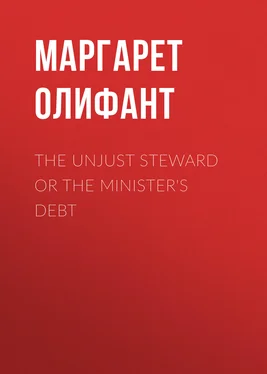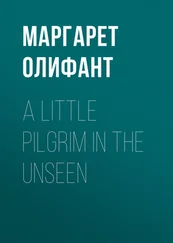Маргарет Олифант - The Unjust Steward or The Minister's Debt
Здесь есть возможность читать онлайн «Маргарет Олифант - The Unjust Steward or The Minister's Debt» — ознакомительный отрывок электронной книги совершенно бесплатно, а после прочтения отрывка купить полную версию. В некоторых случаях можно слушать аудио, скачать через торрент в формате fb2 и присутствует краткое содержание. Издательство: Иностранный паблик, Жанр: foreign_prose, literature_19, foreign_antique, на английском языке. Описание произведения, (предисловие) а так же отзывы посетителей доступны на портале библиотеки ЛибКат.
- Название:The Unjust Steward or The Minister's Debt
- Автор:
- Издательство:Иностранный паблик
- Жанр:
- Год:неизвестен
- ISBN:нет данных
- Рейтинг книги:3 / 5. Голосов: 1
-
Избранное:Добавить в избранное
- Отзывы:
-
Ваша оценка:
- 60
- 1
- 2
- 3
- 4
- 5
The Unjust Steward or The Minister's Debt: краткое содержание, описание и аннотация
Предлагаем к чтению аннотацию, описание, краткое содержание или предисловие (зависит от того, что написал сам автор книги «The Unjust Steward or The Minister's Debt»). Если вы не нашли необходимую информацию о книге — напишите в комментариях, мы постараемся отыскать её.
The Unjust Steward or The Minister's Debt — читать онлайн ознакомительный отрывок
Ниже представлен текст книги, разбитый по страницам. Система сохранения места последней прочитанной страницы, позволяет с удобством читать онлайн бесплатно книгу «The Unjust Steward or The Minister's Debt», без необходимости каждый раз заново искать на чём Вы остановились. Поставьте закладку, и сможете в любой момент перейти на страницу, на которой закончили чтение.
Интервал:
Закладка:
“My dear Mr. Buchanan,” said the writer, “what need to explain the matter to me. You don’t imagine I got my own lads all set out, as thank the Lord they are, without feeling the pinch—ay, and incurring responsibilities that one would wish to keep clear of in the ordinary way of life.”
“Yes,” said the minister, “that was how it was; but fortunately the money was not expended. And I bring you back the fifty pounds—intact.”
Oh, the little, the very little lie it was! If he had said it was not all expended, if he had kept out that little article the—the fifty pounds implying there was no more. Anyhow, it was very different from taking a bill and writing fourscore. But the criminal he felt, with the cold drops coming out on his forehead, and his hand trembling as he held out—as if that were all! these fifty pounds.
“Now bide a wee, bide a wee,” said the writer; “wait till I tell you—Mr. Anderson foresaw something of this kind. Put back your money into your pocket. He foresaw it, the friendly old body that he was; wait till I get you the copy of the will that I have here.” Morrison got up and went to one of the boxes, inscribed with the name of Anderson, that stood on the shelves behind him, and after some searching drew out a paper, the heading of which he ran over sotto voce , while Mr. Buchanan sat rigid like an automaton, still holding out in his hand the bundle of notes.
“Here it is,” said Mr. Morrison, coming back with his finger upon the place. “You’ll see the case is provided for. ‘And it is hereby provided that in the case of any persons indebted to me in sums less than a hundred pounds, which are unpaid at the time of my death, that such debts are hereby cancelled and wiped out as if they had never existed, and my executors and administrators are hereby authorised to refuse any payments tendered of the same, and to desire the aforesaid debtors to consider these sums as legacies from me, the testator.’
“Well, sir,” said the writer, tilting up his spectacles on his forehead, “I hope that’s plain enough: I hope you are satisfied with that.”
For a moment the minister sat and gasped, still stretching out the notes, looking like a man at the point of death. He could not find his voice, and drops of moisture stood out upon his forehead, which was the colour of ashes. The lawyer was alarmed; he hurried to a cupboard in the corner and brought out a bottle and a glass. “Man,” he said, “Buchanan! this is too much feeling; minister, it is just out of the question to take a matter of business like this. Take it down! it’s just sherry wine, it will do you no harm. Bless me, bless me, you must not take it like this—a mere nothing, a fifty pounds! Not one of us but would have been glad to accommodate you—you must not take it like that!”
“Sums under a hundred pounds!” Mr. Buchanan said, but he stammered so with his colourless lips that the worthy Morrison did not make out very clearly what he said, and, in truth, had no desire to make it out. He was half vexed, half disturbed, by the minister’s extreme emotion. He felt it as a tacit indictment against himself.
“One would think we were a set of sticks,” he said, “to let our minister be troubled in his mind like this over a fifty pound! Why, sir, any one of your session—barring the two fishers and the farmer– Take it off, take it off, to bring back the blood—it’s nothing but sherry wine.”
Mr. Buchanan came to himself a little when he had swallowed the sherry wine. He had a ringing in his ears, as if he had recovered from a faint, and the walls were swimming round him, with all the names on the boxes whirling and rushing like a cloud of witnesses. As soon as he was able to articulate, however, he renewed his offer of the notes.
“Take this,” he said, “take this; it will always be something,” trying to thrust them into the writer’s hand.
“Hoot,” said Morrison; “my dear sir, will you not understand? You’re freely assoilised and leeberated from every responsibility; put back your notes into your own pouch. You would not refuse the kind body’s little legacy, and cause him sorrow in his grave, which, you will tell me, is not possible; but, if it were possible, would vex him sore, and that we well know. I would not take advantage and vex him because he was no longer capable of feeling it. No, no; just put them back into your pouch, Buchanan. They are no use to him, and maybe they will be of use to you.”
This was how the interview ended. The minister still attempted to deposit his notes upon Mr. Morrison’s table, but the lawyer put them back again, doing everything he could to restore his friend and pastor to the calm of ordinary life. Finally, Morrison declaring that he had somebody to see “up the town,” and would walk with Mr. Buchanan as far as their ways lay together, managed to conduct him to his own door. He noted, with some surprise, that Mrs. Buchanan opened it herself, with a face which, if not so pale as her husband’s, was agitated too, and full of anxiety.
“The minister is not just so well as I would like to see him,” he said. “I would keep him quiet for a day or two, and let him fash himself for nothing,” he added—“for nothing!” with emphasis.
The good man was much disturbed in his mind by this exhibition of feeling.
“Oh, why were ‘writers’ made so coarse, and parsons made so fine?” He would have said these words to himself had he known them, which, perhaps he did, for Cowper was a very favourite poet in those days. Certainly that was the sentiment in his mind. To waste all that feeling upon an affair of fifty pounds! The wife had more sense, Mr. Morrison said to himself, though she was frightened too, but that was probably for his sake. He went off about his own business, and I will not say that he did not mention the matter to one or two of his brother elders.
“You or me might be ruined and make less fuss about it,” he said.
“When a man had just a yearly stipend and gets behindhand, it’s wae work making it up,” said the other.
“We must just try and see if we cannot get him a bit augmentation,” said Morrison, “or get up a testimonial or something.”
“You see, a testimonial could scarcely take the form of money, and what comfort would he get out of another silver teapot?” observed the second elder, prudent though kind.
It was not a much less ordeal for the minister to meet his wife than it had been to meet the lawyer. She knew nothing about his purpose of taking his bill and writing fourscore, and he dared not let her suspect that he had spoken of the “fifty,” as if that fifty were his whole debt, or that the debts that were forgiven were debts under a hundred pounds. He said to himself afterwards that it was more Morrison’s fault than his, that the lawyer would not let him explain that he had said “this would be something,” meaning that this would be an instalment. All these things he said to himself as he sat alone for the greater part of the day, “reading a book,” which was supposed to be an amusing book, and recovering from that great strain; but he did not venture to tell his wife of these particulars. What he said to Mrs. Buchanan was that Mr. Anderson had assoilised his debtors in general, and that each man was to consider the loan as a legacy, and that Morrison said he was not entitled to take a penny, and would not. His wife took this news with a burst of grateful tears and blessings on the name of the good man who had done this kind thing. “The merciful man is merciful, and lendeth and asketh not again,” she said. But after this outburst of emotion and relief, her good sense could not but object.
“It is an awfu’ deliverance for us, Claude; oh, my man! I had it all planned out, how we were to do it, but it would have been a heavy, heavy burden. God bless him for the merciful thought! But,” she added, “I am not clear in my mind that it is just to Frank. To be sure, it was all in his own hand to do what he liked with his own, and the laddie is but a far-off heir; but still he has been trained for that, and to expect a good fortune: and if there are many as we are, Claude–”
Читать дальшеИнтервал:
Закладка:
Похожие книги на «The Unjust Steward or The Minister's Debt»
Представляем Вашему вниманию похожие книги на «The Unjust Steward or The Minister's Debt» списком для выбора. Мы отобрали схожую по названию и смыслу литературу в надежде предоставить читателям больше вариантов отыскать новые, интересные, ещё непрочитанные произведения.
Обсуждение, отзывы о книге «The Unjust Steward or The Minister's Debt» и просто собственные мнения читателей. Оставьте ваши комментарии, напишите, что Вы думаете о произведении, его смысле или главных героях. Укажите что конкретно понравилось, а что нет, и почему Вы так считаете.












